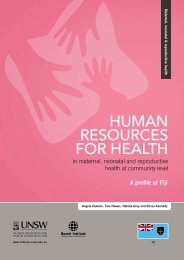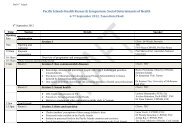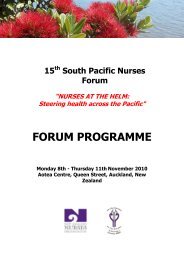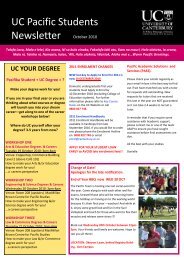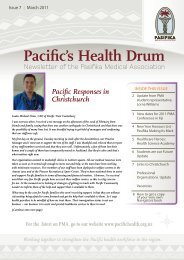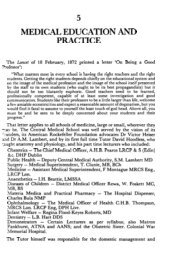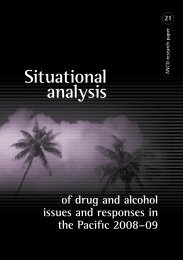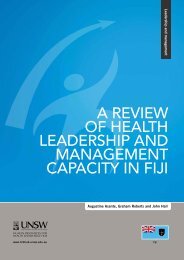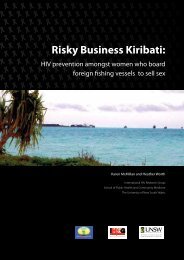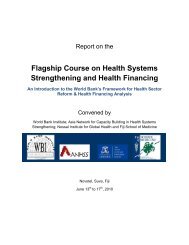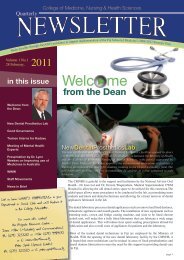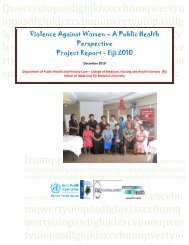rp21 situational analysis - Pacific Health Voices
rp21 situational analysis - Pacific Health Voices
rp21 situational analysis - Pacific Health Voices
You also want an ePaper? Increase the reach of your titles
YUMPU automatically turns print PDFs into web optimized ePapers that Google loves.
Cannabis<br />
In 2008, police and customs officers were<br />
reported to be working together to complete<br />
passenger searches for illicit substances<br />
on ferry services, which yielded nothing. 902<br />
In a subsequent tip-off, police arrested a<br />
number of young men. At the time of the<br />
campaign, the Acting Police Commissioner,<br />
Motulu Pedro, noted that the police force and<br />
customs rely largely on the public to identify<br />
marijuana users and that Tuvalu police do<br />
not have the technology to monitor the entry<br />
of drugs into the country. 903 The majority of<br />
the police force have been trained to identify<br />
marijuana by smelling it, and also by looking<br />
at it through a microscope. In addition,<br />
there are plans to propose that police in Fiji<br />
and Tuvalu work together to search every<br />
Tuvalu vessel for drugs before it leaves Fijian<br />
waters. 904 Drugs issues were raised in a late-<br />
2008 session of Parliament, suggesting this<br />
as an issue of increasing concern. 905<br />
Other<br />
As mentioned in the introduction, there are<br />
no reports of any other illicit substance use<br />
in Tuvalu.<br />
16.4 Licit drug trends<br />
Alcohol<br />
Women with ‘alcoholic’ husbands were identified<br />
as a group facing hardship in a 2003<br />
Asian Development Bank report on hardship<br />
in Tuvalu. The paper reported that the<br />
hardship is related to lack of opportunity<br />
and limited resources, rather than poverty. 906<br />
A survey of 250 people from a combination<br />
of urban and rural areas across three<br />
geographical regions indicated that social<br />
and cultural change, particularly around increasing<br />
drug and alcohol consumption, was<br />
a contributor to increased hardship (especially<br />
among youths as users and women as<br />
partners of alcoholic husbands). 907 However,<br />
there is a tradition of strong social support<br />
networks, with family, extended family and<br />
the church expected to bear the burden of<br />
responding to the hardship. This traditional<br />
support contrasts with decreasing levels of<br />
obligation from clan, village, community organisations,<br />
government and parliament, in<br />
that order. 908<br />
Significantly, alcohol consumption contributes<br />
to a reported 90 per cent of seafarer<br />
dismissals, with a direct impact on those dismissed,<br />
but also resulting in the tarnished<br />
185<br />
902 Silafaga Lalua, Tuvalu Police toughening up on drug users, Tuvalu-News.TV, 27 December 2006.<br />
Available at: (accessed December 2008).<br />
903 Ibid.<br />
904 Ibid.<br />
905 Ibid.<br />
906 Asian Development Bank (2003), Priorities of the People: hardship in Tuvalu. Manila: ADB.<br />
Available at: .<br />
907 Ibid.<br />
908 Ibid.<br />
Tuvalu



